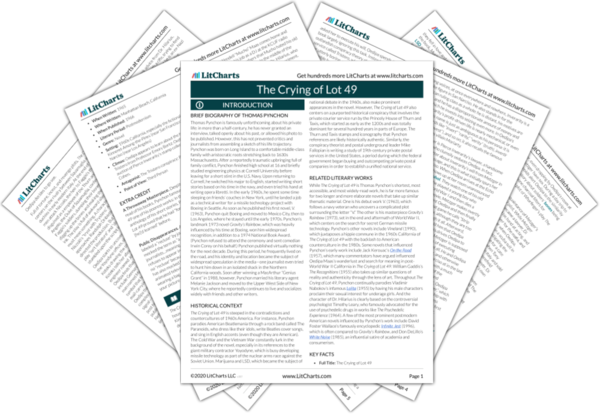Wendell “Mucho” Maas Quotes in The Crying of Lot 49
Chapter 1 Quotes
Yet at least he had believed in the cars. Maybe to excess: how could he not, seeing people poorer than him come in, Negro, Mexican, cracker, a parade seven days a week, bringing the most godawful of trade-ins: motorized, metal extensions of themselves, of their families and what their whole lives must be like, out there so naked for anybody, a stranger like himself, to look at […] Even if enough exposure to the unvarying gray sickness had somehow managed to immunize him, he could still never accept the way each owner, each shadow, filed in only to exchange a dented, malfunctioning version of himself for another, just as futureless, automotive projection of somebody else’s life. As if it were the most natural thing. To Mucho it was horrible. Endless, convoluted incest.
There had hung the sense of buffering, insulation, she had noticed the absence of an intensity, as if watching a movie, just perceptibly out of focus, that the projectionist refused to fix. And had also gently conned herself into the curious, Rapunzel-like role of a pensive girl somehow, magically, prisoner among the pines and salt fogs of Kinneret, looking for somebody to say hey, let down your hair. […] In Mexico City they somehow wandered into an exhibition of paintings by the beautiful Spanish exile Remedios Varo: in the central painting of a triptych, titled “Bordando el Manto Terrestre,” were a number of frail girls with heart-shaped faces, huge eyes, spun-gold hair, prisoners in the top room of a circular tower, embroidering a kind of tapestry which spilled out the slit windows and into a void, seeking hopelessly to fill the void: for all the other buildings and creatures, all the waves, ships and forests of the earth were contained in this tapestry, and the tapestry was the world. Oedipa, perverse, had stood in front of the painting and cried.
Chapter 4 Quotes
“Patents,” Oedipa said. Koteks explained how every engineer, in signing the Yoyodyne contract, also signed away the patent rights to any inventions he might come up with.
“This stifles your really creative engineer,” Koteks said, adding bitterly, “wherever he may be.”
“I didn't think people invented any more,” said Oedipa, sensing this would goad him. “I mean, who's there been, really, since Thomas Edison? Isn't it all teamwork now?” Bloody Chiclitz, in his welcoming speech this morning, had stressed teamwork.
“Teamwork,” Koteks snarled, “is one word for it, yeah. What it really is is a way to avoid responsibility. It's a symptom of the gutlessness of the whole society.”
“Goodness,” said Oedipa, “are you allowed to talk like that?
“Then the watermark you found,” she said, “is nearly the same thing, except for the extra little doojigger sort of coming out of the bell.”
“It sounds ridiculous,” Cohen said, “but my guess is it's a mute.”
She nodded. The black costumes, the silence, the secrecy. Whoever they were their aim was to mute the Thurn and Taxis post horn.
[…]
“Why put in a deliberate mistake?” he asked, ignoring—if he saw it—the look on her face. “I've come up so far with eight in all. Each one has an error like this, laboriously worked into the design, like a taunt. There's even a transposition—U. S. Potsage, of all things.”
Chapter 5 Quotes
She remembered John Nefastis, talking about his Machine, and massive destructions of information. So when this mattress flared up around the sailor, in his Viking’s funeral: the stored, coded years of uselessness, early death, self-harrowing, the sure decay of hope, the set of all men who had slept on it, whatever their lives had been, would truly cease to be, forever, when the mattress burned. She stared at it in wonder. It was as if she had just discovered the irreversible process. It astonished her to think that so much could be lost, even the quantity of hallucination belonging just to the sailor that the world would bear no further trace of.
Oedipa spotted among searchlights and staring crowds a KCUF mobile unit, with her husband Mucho inside it, spieling into a microphone. She moseyed over past snapping flashbulbs and stuck her head in the window. “Hi.”
Mucho pressed his cough button a moment, but only smiled. It seemed odd. How could they hear a smile? Oedipa got in, trying not to make noise. Mucho thrust the mike in front of her, mumbling, “You’re on, just be yourself.” Then in his earnest broadcasting voice, “How do you feel about this terrible thing?”
“Terrible,” said Oedipa.
“Wonderful,” said Mucho. He had her go on to give listeners a summary of what’d happened in the office. “Thank you, Mrs Edna Mosh,” he wrapped up, “for your eyewitness account of this dramatic siege at the Hilarius Psychiatric Clinic. This is KCUF Mobile Two, sending it back now to ‘Rabbit’ Warren, at the studio.” He cut his power. Something was not quite right.
“Edna Mosh?” Oedipa said.
“It’ll come out the right way,” Mucho said. “I was allowing for the distortion on these rigs, and then when they put it on tape.”












